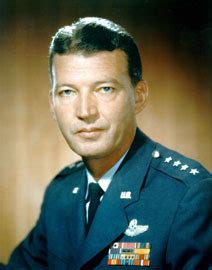A Fiery Peace in a Cold War: Bernard Schriever and the Ultimate Weapon
 The American space program, like its Russian counterpart, was largely an epiphenomenon of the ballistic missile program. A great deal has been written about the space programs; regarding the missile programs themselves, not so much. This book remedies that gap by using the life of General Bernard Schriever, who ran USAF missile development programs, as the centerpiece for a history of the Cold War’s defining weapon. Although Schriever is the central character, the book describes the roles played by many other individuals, including:
The American space program, like its Russian counterpart, was largely an epiphenomenon of the ballistic missile program. A great deal has been written about the space programs; regarding the missile programs themselves, not so much. This book remedies that gap by using the life of General Bernard Schriever, who ran USAF missile development programs, as the centerpiece for a history of the Cold War’s defining weapon. Although Schriever is the central character, the book describes the roles played by many other individuals, including:
–John von Neumann, the Hungarian-American mathematician–an implacable enemy of the Soviet Union who advocated a strong American military posture and perhaps even a nuclear first strike
–The bomber general Curtis LeMay, who to put it mildly was not a Schriever fan. After Schriever received his fourth star, LeMay glared at him and said, “You realize if I had my way, you wouldn’t be wearing those.”
–Simon Ramo, who as a high school student withdrew all his savings to buy a violin in the hopes of winning a college scholarship in a music contest…he did win, and as a young engineer was chosen by GE over another job candidate because the Schenectady orchestra needed a good violinist! Ramo went on to co-found the Ramo-Wooldridge Company (later TRW) which basically created the discipline of systems engineering and was used by Schriever to address some of the most difficult technical challenges facing the missile program.
–Colonel Ed Hall–a brilliant designer of missile engines, a hard-driving project manager, and in the opinion of many associates a complete jackass to work with. To call Hall “assertive” would be putting it mildly–when his wife was giving birth (in England during WWII) and the obstetrician was in Hall’s opinion acting indecisively, Hall pulled out his revolver and gave the doctor highly specific orders as to exactly what to do.
Schriever himself was a boy from a not-very-well-off family of German immigrants in the Texas hill country, who joined the air force after first considering a career as a professional golfer. He became a protege of Hap Arnold, and after Pacific-theater service during WWII focused on the leadership of R&D efforts rather than operational command. Throughout his career, Schriever demonstrated an unwillingness to fit his views on important issues to the opinions of those in higher authority–even when higher authority was represented by someone as intimidating as LeMay, with whom Schriever clashed soon after the war on the issue of high-level versus low-level attack tactics for bombers, or Secretary of the Air Force Harold Talbott, whose order to relocate certain missile facilities (from the west cost to the midwest) Schreiver flatly refused, citing his “prior and overriding orders” to get the program done in the shortest feasible time. By then a general, Schriever stuck by his position on this even when Talbott threatened him that “Before this meeting is over, General, there’s going to be one more colonel in the Air Force!”
Read more
 The American space program, like its Russian counterpart, was largely an epiphenomenon of the ballistic missile program. A great deal has been written about the space programs; regarding the missile programs themselves, not so much. This book remedies that gap by using the life of General Bernard Schriever, who ran USAF missile development programs, as the centerpiece for a history of the Cold War’s defining weapon. Although Schriever is the central character, the book describes the roles played by many other individuals, including:
The American space program, like its Russian counterpart, was largely an epiphenomenon of the ballistic missile program. A great deal has been written about the space programs; regarding the missile programs themselves, not so much. This book remedies that gap by using the life of General Bernard Schriever, who ran USAF missile development programs, as the centerpiece for a history of the Cold War’s defining weapon. Although Schriever is the central character, the book describes the roles played by many other individuals, including: